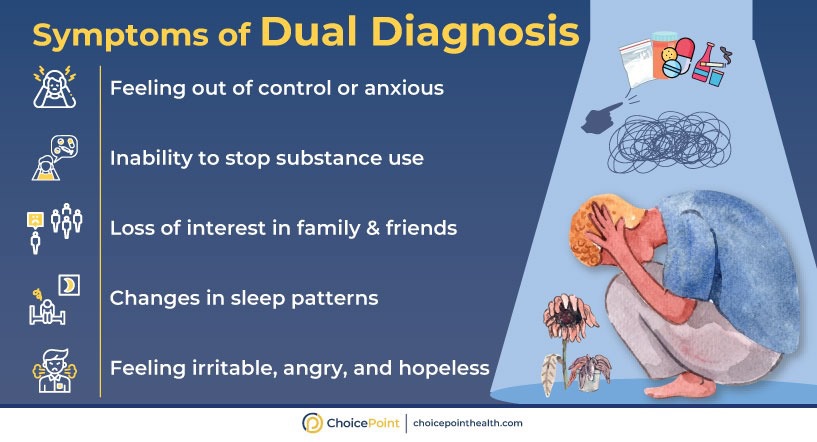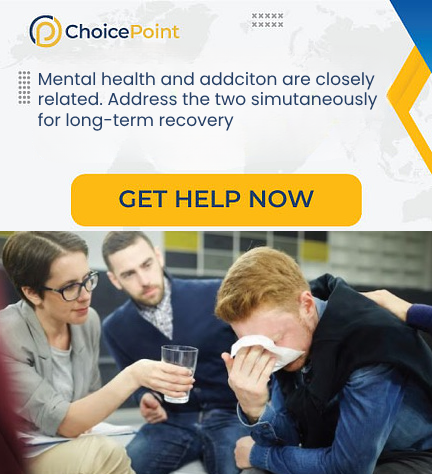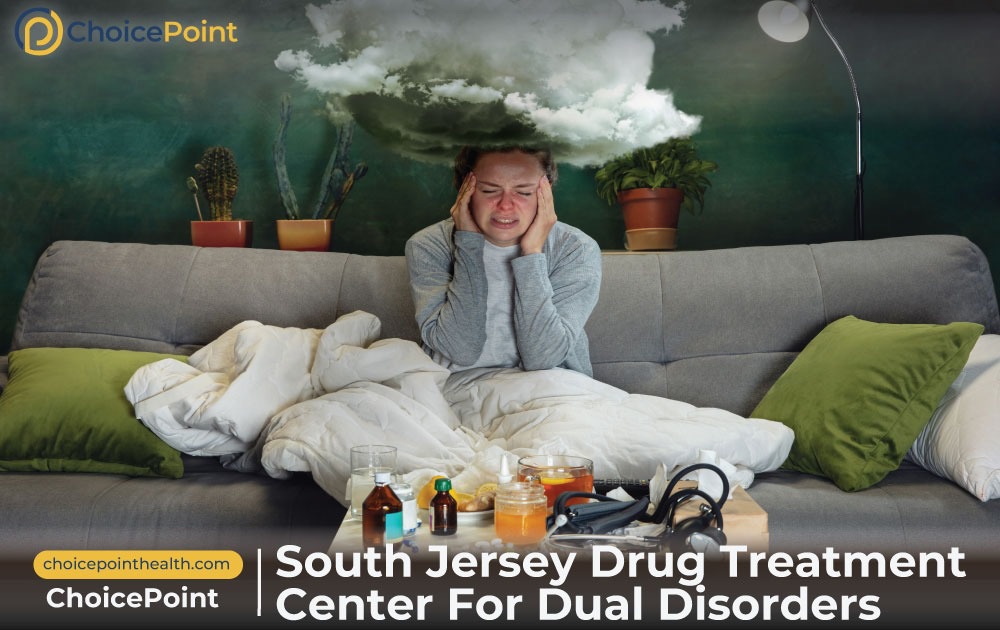According to the Center for Addiction and Mental Health, people with mental health issues are twice as likely to develop the habit of substance use disorder. Many difficult conditions, such as ADHD, anxiety, etc., can cooccur with addiction, intensifying a patient’s exhaustion, frustration, and suffering. The best treatment is the one that caters to both conditions at once. Below is our guide to what the South Jersey Drug Treatment Center offers regarding dual diagnoses and how ChoicePoint Technical Center can help.
Therapists like Samantha Socarras believe undergoing comprehensive treatment to address addiction and psychological issues is essential. Contact 844.445.2563 or fill out this form for further support.
Table of Contents
Dual Diagnosis Explained
Dual diagnosis is a condition where addiction co-occurs with any mental health condition. You may also know it by co-morbidity or co-occurring disorder(s). Dual diagnosis occurs more commonly than it is expressed. About 50% of those struggling with SUDs were found to have one or more mental illnesses.
Commonly Occurring Disorders
Some mental illnesses are more likely to co-occur with addiction. Some examples are given below.
Generalized Anxiety Disorder and SUDs
3.9 million people reported misusing benzodiazepines in 2021. Generalized anxiety disorder is characterized by a persistent worry about things that may sometimes be irrational. People diagnosed with GAD are more prone to getting engaged in substance abuse. This is the most frequently co-occurring psychological condition in the US. Researchers believe this is so by design, i.e., anxiety puts you at risk of misusing substances for temporary relief and vice versa.
ADHD and Stimulant Abuse
ADHD triples the risk of substance use disorders. The lack of dopamine in the ADHD-affected brain translates to misuse of stimulants. This abuse is common among people with ADHD. Here are some prescription and illicit stimulants that are misused:
- A study found that 10.4% of subjects misusing meth had ADHD.
- Misuse of stimulants among those without ADHD has increased. This can lead to the development of ADHD-like symptoms.
Book an appointment with us to understand how the South Jersey Drug Treatment Center offers detox to help you manage stimulant abuse and ADHD. You can dial 844.445.2563.
Schizophrenia and Substance Abuse
People with schizophrenia are at risk of misusing cocaine, nicotine, cannabis, etc. There is a strong link between the two conditions. Here are the findings of one of the studies on the subject:
- Symptoms of Schizophrenia include psychosis and paranoia. Using substances like cocaine can worsen them.
- Cannabis use can distract patients from following proper treatment
- A holistic treatment that addresses both conditions should be followed for positive outcomes.
There are times when cocaine use induces paranoia and hallucinations, which means that cocaine use disorder can also lead to Schizophrenia-like symptoms.
Take treatment only from a specialized dual diagnosis facility in South Jersey. The treatment will not yield proper results unless addiction and mental illness are addressed.

What Are Early Signs of Dual Disorders?
Types of Care in South Jersey Drug Treatment Center
If you are looking for a dual diagnosis treatment center, it is important to understand the options you may get at a South Jersey Drug Treatment Center. Below is a guide to all the types of settings you may expect.
Inpatient Rehabilitation
Inpatient rehab offers around-the-clock care for a specific time duration. The program’s longevity can range from a week to several months, depending on your condition and plan. Inpatient rehab includes the following services:
Why you need to choose Inpatient rehab may depend on how you are doing; if your addiction is moderate to severe, then you need appropriate medical supervision and assistance for your mental health condition. Inpatient rehab may last as long as a week to several months, depending on the level of care required.
Intensive Outpatient Rehab/Outpatient
Outpatient or intensive outpatient rehabilitation refers to a setting where procedures are conducted, and you return to your home. Services include medication, detox, and counseling, but for the most part, responsibility rests with you since there is no 24-hour supervision or support. Usually, IOP will be conducted 3 to 4 hours per day.
Decide what’s best for you by consulting our addiction specialists before selecting a South Jersey Treatment Center. Contact 844.445.2563 or fill out this form.
Partial Hospitalization Program (PHP)
A partial hospitalization program (PHP) is also categorized under outpatient care but is more intense than an IOP. In IOP, only a few hours of the day are dedicated to counseling or detox, while in PHP, you spend almost 5 to 6 hours every day for 3 to 5 days at the hospital and return home at night.
Virtual Care Settings
The trend of telehealth addiction treatment has made buzz post-pandemic. Due to the hike in gas prices and tight financial conditions, many people are moving towards virtual assistance by DEA-certified practitioners. Here are some of the benefits of telehealth treatment:
- Research suggests that it is just as effective as in-person treatment, if not more
- It is convenient to get treatment from your home
- You can still get medical support if your mental illness hinders you from visiting the rehab center.
- Driving is not safe under the influence of addictive substances, so undergoing telehealth treatment is preferable.
Perks of Telehealth Treatment
- Flexible scheduling
- No work-related issues
- Availability of online prescriptions for medications
- Attaining at-home drug testing
- Treatment is available with an internet connection
Visit our technology center at South Jersey Drug Treatment Center, which virtually links you to our NJ facility and get treatment quickly! Dial 844.445.2563 or complete this form for more info.
Defeating Comorbidity with South Jersey Drug Treatment Center
Dual diagnosis is challenging, but choices are available with new advances and a better understanding of interventions. You only need to take care of a few determinants of a good treatment center:
- Opt only for a specialized dual diagnosis treatment program
- Do your research before selecting a facility
- Only get treatment from a certified practitioner
Also, remember that:
- Any care is effective as long as you work closely with your provider.
- Relapse does not indicate that you have failed.
- Recovery is not a deadline that you need to meet. Instead, it is a continuous process.
Feel free to contact us with any queries regarding your dual-diagnosis treatment program. All you need to do is contact 844.445.2563 or fill out the information in this form.
FAQs
What are the problems with dual diagnosis?
Dual diagnosis puts patients more at risk of developing self-harming habits. The treatment becomes difficult if underlying conditions are not addressed. This problem can only be overcome when specialized programs are opted for.
How does substance use affect mental health?
Substance use meddles with the chemistry of our brains, causing a person to become dependent on substances to feel good. Once the brain becomes habitual of drugs or alcohol, it can lead to mental health issues like anxiety, depression, etc.
What is the most effective treatment for dual diagnosis?
The most effective way to approach dual diagnosis is by opting for integrated interventions tailored to every patient’s needs. Treating both conditions holistically is the most productive way to deal with dual diagnosis.
What are some potential higher risks for people with a dual diagnosis?
If dual diagnosis remains untreated, it worsens the mental health condition and may lead to relapse, unhealthy behaviors, halted social life, and suicide. People with no support system may also end up homeless if either condition is not treated.
South Jersey Drug Treatment Center for Dual Disorders: Use Our Technology Center And Get the Help You Need!
In conclusion, you can overcome the challenges of co-occurring disorders with the right type of care, which may include inpatient and outpatient rehabilitation, partial hospitalization programs, and virtual care settings. Remember to do your research, choose a certified practitioner, and work closely with your provider for effective care. Recovery is a continuous process, and relapse does not indicate failure.
Medical Disclaimer:
ChoicePoint aims to improve the quality of life for people struggling with substance use disorder and mental health issues. Our team of licensed medical professionals research, edit and review the content before publishing. However, this information is not intended to be a substitute for professional medical advice, diagnosis, or treatment. For medical advice please consult your physicians or ChoicePoint's qualified staff.

Start Your Journey Toward Recovery!










Review South Jersey Drug Treatment Center For Dual Disorders.